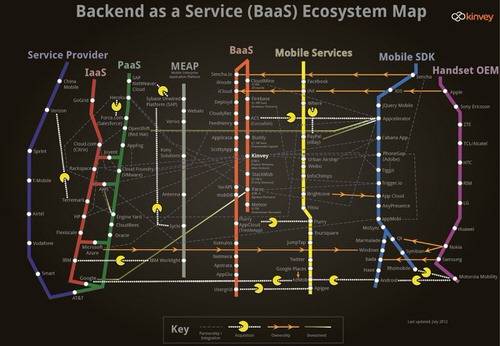
Yesterday, Facebook bought Parse, a San Francisco startup with a service designed to greatly simplify the process of creating mobile and Web apps. Today, Parse’s rivals are doubtless celebrating because the (reportedly) $85 million acquisition effectively puts a big seal of approval on their techniques for automating some aspects of app development.
(See also: What Happens When Almost Anybody Can Build A Mobile Business App?)
In tech jargon, outfits like Parse are often called “backend as a service” (or, worse, BaaS) companies. But they could be better described as mobile cloud-service companies. They offer services designed to easily tie mobile apps into the cloud, providing a host of automatic “backend” functions such as data storage and connections to social networks. That allows developers to focus on the core elements that make their apps sing instead of doing a lot of complicated integration with cloud systems.
One of the companies paying closest attention to Facebook’s move is Boston-based Kinvey, one of Parse’s biggest rivals and a startup eager to see this cloud-service market really hit the big time.
What This “Validation” Means
Over the space of a few months in 2011, three startups effectively created this app-service automation market. Parse, StackMob and Kinvey promised easy cloud integration to mobile developers, but lookalikes quickly surfaced. Cocoafish (acquired by Appcelerator, Tiggzi (now Appery.io), FeedHenry, Applicasa from the startup end, new services from the likes of Sencha (Sencha.io) andeven Apple (iCloud) joined the fray. IBM and SAP now also offer similar cloud solutions.
(See also: Parse Offers “Backend as a Service” to Mobile Developers)
Some critics wondered if the industry segment had become too crowded and if all the outside entrants would doom the three original backend-service providers. They were small, their business models were unproven and their stories (i.e., “we provide backends so you don’t have to”) were quickly in danger of being drowned out by competition claiming the same thing. There was a time in 2012, before it raised its first venture funding, when Kinvey had serious doubts if it would make it.

Then these companies, which initially had started as developer tools, started turning into actual businesses. StackMob and Kinvey found that big companies were really interested in their services. Parse started attracting brands like the NFL’s Green Bay Packers, Hipmunk, Armani and the Food Network.
(See also: Bringing Enterprise Data To Your Mobile Workers)
It’s no coincidence that Facebook named Parse, StackMob and Kinvey (along with the likes of PhoneGap and Sencha) as preferred technology partners last week. These are companies with useful skill sets. All three have done extensive work with Facebook in the past.
Many in the tech community associate “validation” of a new technological or business approach with startup venture funding or outright acquisition. But the likes of Parse arguably found validation much earlier, with the arrival of big, high-profile customers.
“Lots of people are saying [the Parse acquisition] ‘validates’ the space,” said Sravish Sridhar, CEO and co-founder of Kinvey. “I disagree. The space was validated when brands like J&J, Aetna GSN and Cadillac began trusting their data and apps to BaaS.”
Sridhar has a point. But until Parse sold out, none of these startups had entered the “big money” realm of tens of millions in funding, revenue or acquisition. In that sense, the Facebook-Parse deal has definitely lifted the prospects of StackMob, Kinvey and the rest of their competitors.
Where Do These Startups Go From Here?
Parse reportedly had a long line of suitors. Facebook won the bidding, but Dropbox, Google and Yahoo also all apparently had interest, according to Wall Street Journal reporter Evelyn Rusli. A variety of other companies have also shown interest in the backend-service startups, including Salesforce (customer relationship management), Intel (chip manufacturing and developer tools) and classic enterprise service providers like IBM and SAP, which have acquired mobile enterprise application platforms (MEAPs) in the past.
When parsing what the Parse acquisition means to companies like Kinvey and StackMob last night, Kinvey’s head of marketing Joe Chernov turned to Sridhar and said, “Do you know of any other tech space that has so many different kinds of big companies wanting to acquire its vendors?”
It’s a good question and one that should have the likes of Kinvey and StackMob hi-fiving, jumping in their seats and making plans for happy hour.
Twitter will be the next company to watch. It recently bought Boston-based Crashlytics and Bluefin for a total a little less than $200 million. Twitter is beefing up on its own application ecosystem (see: Vine and Twitter Cards) and could very easily find a place for backend services in its app efforts.

















